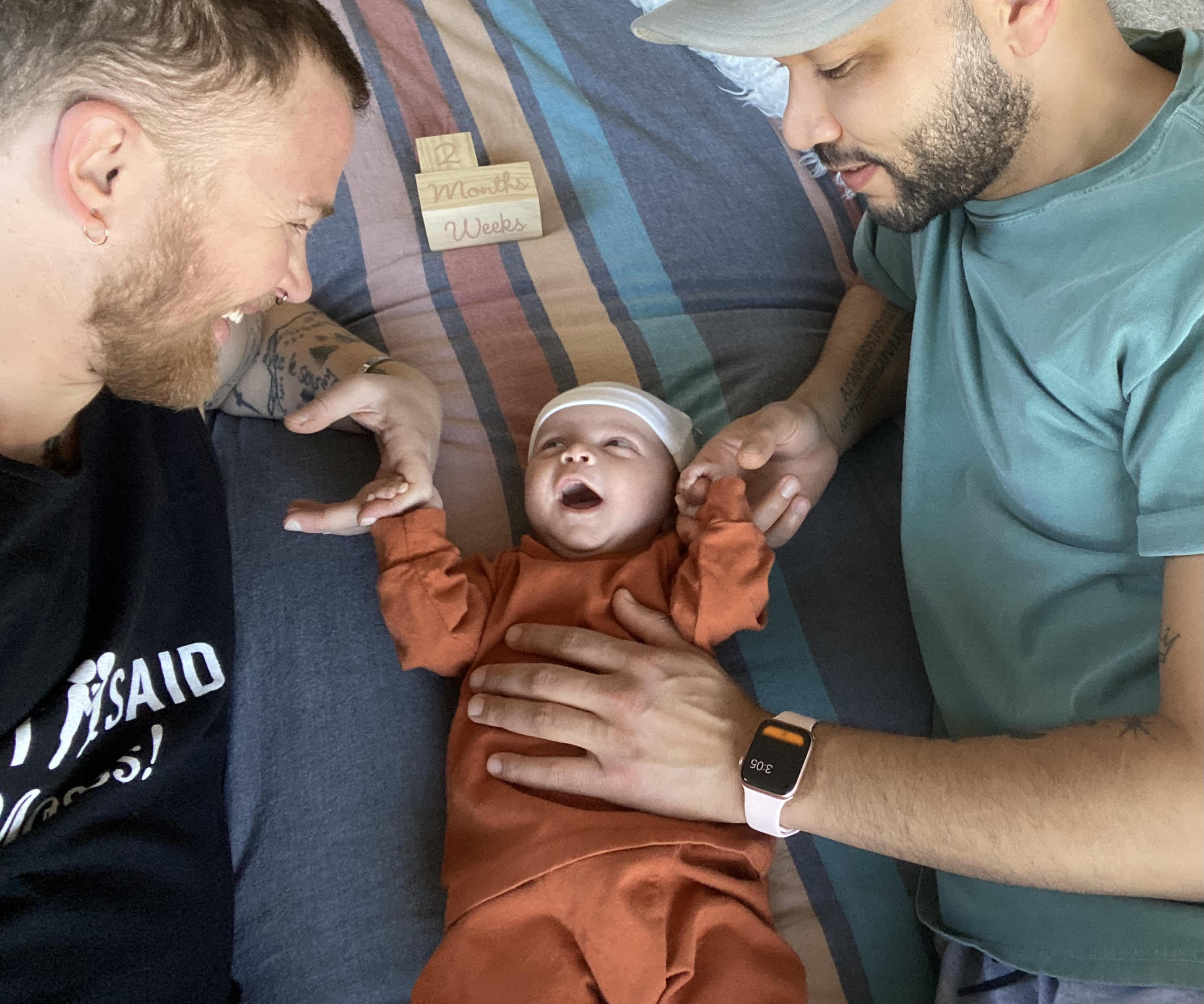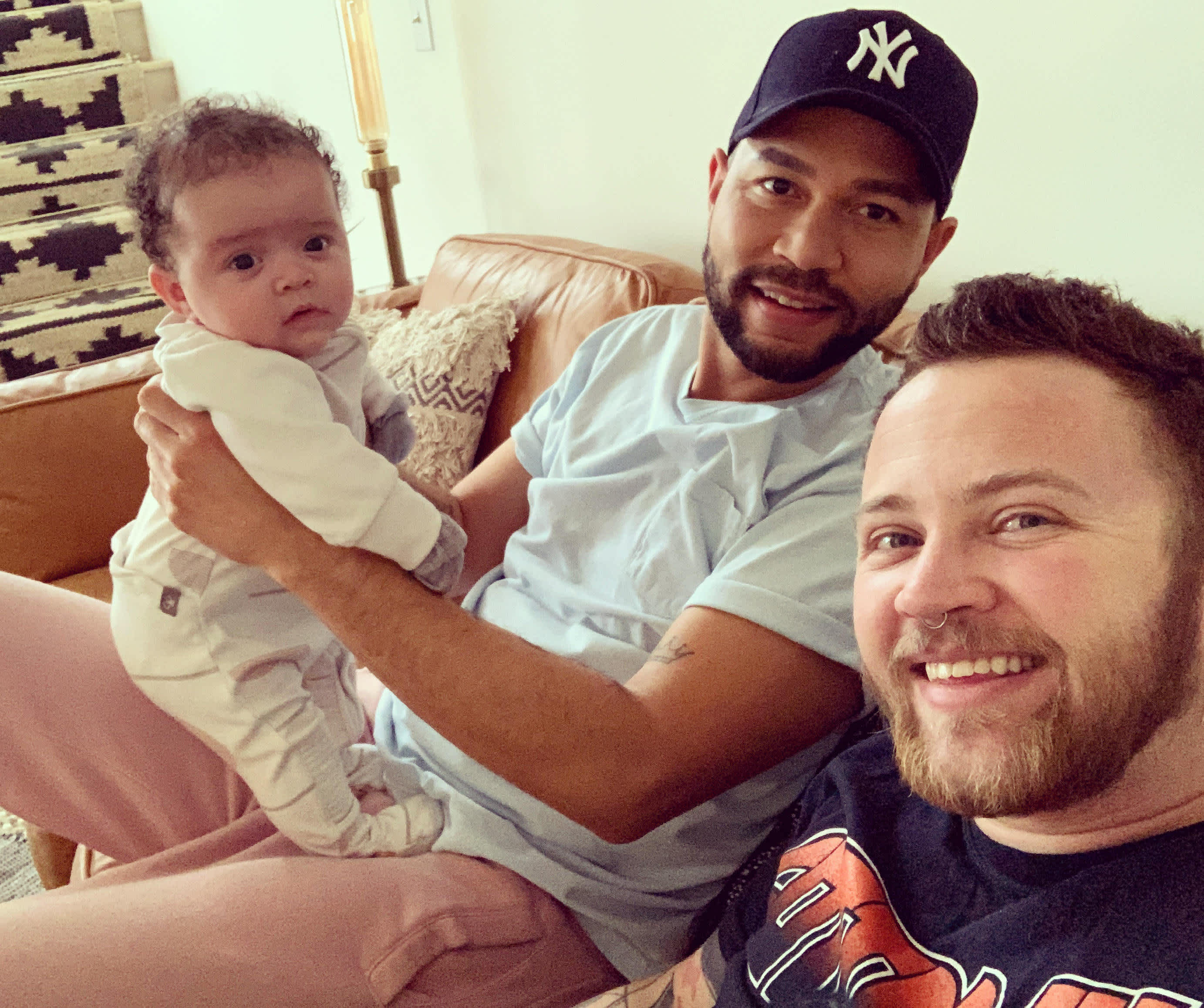Photography by Franz Grünewald
What it's like to be pregnant as a transmasculine person
"I am a better parent because I’m trans, not in spite of it."
Across the world, pregnancy and birth are surrounded by cultural traditions and expectations. For many people, those expectations are tied to femininity and womanhood. As a pregnant person, your prenatal visits may be at a “women's center,” decorated with photos of pregnant women’s bodies. You might read books with pink, flowery covers that address you as “mommy.” For many women, the hyper-feminised pregnancy and birth experience is difficult to identify with.
So if pregnancy and birth culture makes some women feel uncomfortable, what must it feel like to experience pregnancy as a transgender man or transmasculine person?
Yes, transgender men and transmasculine people can get pregnant (1). In fact, they get pregnant at rates similar to people who identify as women and have more planned pregnancies than cisgender women (2). Yet, the healthcare system is not set up to care for pregnant and birthing men. We asked Bennett Kaspar-Williams, a transmasculine person, to tell us about his journey through pregnancy, birth, and postpartum. Here’s what he wishes everyone knew about pregnancy as a transmasculine person.
The following is an excerpt from an interview with Bennett that captures his individual experience. The Clue Science Team has verified any science facts in the following interview.
Can a trans man become pregnant on testosterone?
Bennett says: Many transgender men or transmasculine people take testosterone. It’s technically possible for someone who is actively taking testosterone to ovulate and still get pregnant, but it’s not the recommended way to try to achieve a pregnancy. After a trans man stops taking testosterone, menstruation will eventually occur (if they have ovaries and a uterus), then become predictable enough to attempt a pregnancy.
What’s it like to be trans and pregnant in the healthcare system?
Bennett says: At first I was concerned about receiving adequate, compassionate care from healthcare professionals during my pregnancy journey. There are a few places that specialize in trans pregnancy throughout the country, but unfortunately none available near me. When I set out to find a provider, I looked for one who had hormone therapy listed on their website, hoping maybe they would have some competency in trans health. I ended up finding someone who had at least met a trans person before, so that was a good start.
It was common throughout the pregnancy for me to end up educating the nurse/ultrasound technician/doctor on my situation because frankly, there isn’t a lot of institutionalized learning around trans folks being pregnant. The healthcare providers were open and respectful, but I was lucky in that respect because I’m in California. Even still, I was definitely the first pregnant trans person anyone in the facility had seen.
I coped by having a sense of humor about it. Everything surrounding birth is centered around “women.” It has just always been that way and it’s really challenging for people to think of it differently. You have to be ok with being in women’s spaces. If you can’t, if you feel it will be traumatizing or trigger some bad dysphoria, maybe being trans and pregnant isn’t for you. Luckily, being in women’s spaces doesn’t really bother me but I understand that it could be traumatic for some people.

Bennett and his husband, Malik.
How can health systems be more inclusive to trans pregnant people?
Bennett says: The institution of pregnancy needs a makeover because it would liberate a lot of folks. The language and branding of pregnancy would be the easiest things to change—this would have a big impact for trans and gender non-conforming people. And it wouldn’t just be for these folks—it would also be for women who don’t identify with a lot of the overly feminine language and imagery. The way pregnancy is presented sets you up to feel like you’re some place you don’t belong. When it comes to the information you receive in pregnancy, everything is pink and covered in butterflies. This is just unnecessary when it comes to learning about your fetus’ development. In the actual appointments with healthcare providers, the language isn’t gendered. Somebody talking to me about my uterus growing or my baby developing isn’t gendered, it’s just talking about body parts. It’s the culture surrounding pregnancy that needs to change.
How can pregnancy culture be more inclusive to trans pregnant people?
Bennett says: Nearly everything I encountered during pregnancy, from resources to products, was centered around the concept of “motherhood.” This didn’t make me feel dysphoric, but it did make me feel like I was participating in something that was not “for me.” Instead, I wish resources focused on just exactly what the process is: carrying a child.
The concept of “motherhood” is politicized and marketed in a way that doesn’t speak to my experience. The overly-gendered concept of “motherhood” is what kept me from embracing the idea of carrying a child for so long, particularly pre-transition. If the notion of carrying was more gender inclusive, I might have wanted to embark on this journey earlier in my life. It was not really until I encountered so many other trans men on this journey on social media that I realized that pregnancy can be separated from womanhood.

Bennett with his husband, Malik, and their baby.
How can friends and family better support trans pregnant people?
Bennett says: One of the best things allies can do is to take the time and energy to educate themselves about trans pregnancy, rather than asking a pregnant trans person to do that labor. Instead of conversations about motherhood, change the conversation to “parenthood.” Discuss more specifically about the culture of child-carrying, rather than reducing it to gender.
You can also amplify our voices by advocating for changes in the law where you live. Some laws prevent a pregnant trans man from being listed as the “father” or “parent” on the child’s birth certificate, rather than being defaulted to the “mother.” Some health insurance providers and employer parental leave policies don’t include trans men to be covered as gestational parents. These are all policy issues allies can help us change.
People try to make being pregnant as a masculine person out to be weird, but it’s not. It’s not a new concept. Masculine people have been pregnant and birthing as long as there have been people. In reality, my relationship with my child isn’t different—it’s very basic. I am a better parent because I’m trans, not in spite of it.
What else would you change about pregnancy culture?
Bennett says: Finding pregnancy clothing was a real challenge for me. Oversized t-shirts and sweatpants are just not my style, and wearing them left me feeling not great about myself. After hours of searching, I finally found more gender neutral pregnancy clothes at ASOS. I wish there were clothes for pregnant people that were also designed with a masculine aesthetic in mind.

You can follow Bennett’s parenthood journey on Instagram @bennettonpurpose. You can follow his husband Malik @designedbymalik and @malikdubs.
If you’re a healthcare provider and want to learn more about how to better care for transgender people, you can access a list of training programs and clinical guidelines here. If you’re a trans ally and want to support transgender people who are pregnant, Bennett suggests watching this film by transgender filmmaker Freddy McConnell who documented his own pregnancy and its challenges. You can also check out this helpful workbook for tips and strategies on being the best trans ally you can be.
At Clue, we recognize that pregnancy as a gender non-conforming or trans person may trigger dysphoria, especially when many pregnancy providers do not have adequate training on trans pregnancy.
The Clue Pregnancy mode was designed to include all pregnant people. It is gender neutral to reduce the possibility of dysphoria as much as possible. Plus, it’s science-based and full of everything you need to know about pregnancy and fetal development.
